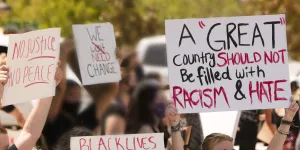The best philanthropic initiatives from 2020 can show us the path for giving in 2021
It’s easy to get depressed about the state of the world this year. The coronavirus pandemic, racial injustice, wildfires and the breakdown of democratic norms have many of us feeling down. But 2 things are giving me hope these days: the massive demonstrations for racial justice and philanthropy’s increasing willingness to fund movements.
Millions of Americans have taken to the streets this year to demand racial justice. Maurice Mitchell and Ash-Lee Woodard Henderson — who are co-leading a great new initiative called The Frontline – estimate that 26 million people have been part of the protests, making this the largest mass movement since the Civil Rights Movement.
You might be surprised to hear this from someone who is usually highly critical of the sector, but I think philanthropy has come through in some major ways this year. Foundations and high-net-worth donors are moving real money to the organizations driving change. This is different than with the Civil Rights Movement, when only 4 foundations really stepped up.
Here are what I see as some of the bright spots:
Women donors are leading the way
MacKenzie Scott’s first round of giving was the best initial foray into philanthropy by a billionaire that I’ve ever observed. She did a ton of things exactly right with that first $1.7 billion in grants: She gave a huge sum of money quickly, prioritized equity and funded amazing organizations that strive to make our nation more just.

MacKenzie Scott
Importantly, she didn’t try to get groups to work on her preferred campaigns, but instead gave unrestricted gifts. There’s a lot to celebrate, and I hope other donors will follow her lead.
Susan Sandler stepped up in a big way this year, too. The giving of the Sandler Foundation has been fantastic for a long time. In fact, we awarded the foundation an NCRP Impact Award in 2016.
In September, Sandler announced she would invest $200 million in racial justice organizations. Importantly, she communicates incredibly clearly why she believes that power, not persuasion, is key to transforming society. She’s also prioritizing investments in the South and Southwest.
NCRP’s As the South Grows reports with Grantmakers for Southern Progress show the importance of funding in the South. Sandler rightly understands that we have to invest in those regions that have historically been underfunded by philanthropy.
Large private foundations are moving huge sums to racial and social justice
The Ford Foundation made headlines in June when they decided to issue social impact bonds so they could spend $1 billion more in 2020 and 2021.
Hilary Pennington, the foundation’s executive vice president of programs, shared with me by email that, “A big category of social impact bond grants will be to support organizations working on racial justice. At least $180 million from the proceeds of the bond will support racial justice advocacy in the United States. Together with regular grantmaking, this doubles our annual commitment to this work to more than $330 million over 2020 and 2021.”
Additionally, Pennington told me that the foundation’s grants for Black, Indigenous and people of color-led arts organizations “was made possible entirely by the social impact bond.” The total investment in those organizations is $160 million, and $85 million of that is coming from Ford.
Pennington also noted that the foundation’s $10 million investment in Puerto Rico, a part of the U.S. often ignored by philanthropy, was also made possible by the proceeds from the bond issue. (NCRP, Hispanics in Philanthropy and others have called on philanthropy to increase support for Puerto Rico.)
In June, the Andrew Mellon Foundation announced it would prioritize social justice in all of its grantmaking. This is a huge and welcome evolution. The foundation has been giving about $300 million in grants annually in recent years and is increasing that significantly in 2020 and 2021.
Open Society Foundations is also backing movements in a big way. The foundation announced in July a new influx of $220 million for racial justice, mostly for Black-led organizations. (OSF received an NCRP Impact Award in 2015.)
Back in May, Omidyar Network pledged $35 million to help workers build power. The shift in the philanthropy of the Omidyars the past few years is really exciting.
Recently, the Surdna Foundation announced it would spend an additional $36 million for racial justice over the next 3 years. It’s the first time in its 103-year history the board has increased the foundation’s grantmaking.
“We’re boosting our spending by 29% over the next 3 years because our board members believe that our resources could make an outsized difference now, when the U.S. is experiencing a reckoning on race and there’s a period of heightened public will to address systemic racism,” said Don Chen, president of Surdna Foundation. “For us, the most challenging part was determining how to spend more during a time of great economic uncertainty, so we deliberated over the pros and cons of different levels of increased spending and eventually agreed to step up our grantmaking in a strong way.”
Smaller foundations are making big moves, too.
I’ve been impressed with the grantmaking of several smaller foundations, too.
Wallace Global Fund, Hill-Snowdon Foundation, Mary Reynolds Babcock Foundation and others have increased spending and are funding movements and community organizing. (Hill-Snowdon received an NCRP Impact Award in 2014.)
Meyer Memorial Trust (MMT) made a $25 million commitment to Justice Oregon for Black Lives. (MMT received an NCRP Impact Award in 2017.)

Demonstrators in Temecula, California, protest the police killings of George Floyd and Breonna Taylor. Foundations and wealthy donors have shown an increased willingness to fund racial justice movements in recent months.
Nellie Mae Education Foundation announced an additional $20 million in funding to combat anti-Black racism and for COVID-19 relief.
The Libra Foundation was one of the first funders to announce they were doubling grant spending in 2020 in response to this urgent moment. They had been planning to give $25 million and they increased that to $50 million, noting their “deep commitment to supporting organizations led by and building power with those most impacted by systemic oppression.”
Then, in September, Libra spearheaded the creation of the Democracy Frontlines Fund, which is providing $36 million “to fund Black-led organizers fighting for free and fair elections and working to defund prisons and police.” The funding comes from 10 foundations, including Libra, William and Flora Hewlett Foundation, MacArthur Foundation, Schmidt Family Foundation, Sobrato Philanthropies and others. (Libra received an NCRP Impact Award in 2019.)
The Kolibri Foundation, a new family foundation, made a commitment to fund the Movement for Black Lives (M4BL) with $500,000 a year for 10 years.
“We decided to fund M4BL with a decade long legacy grant. Our hope was to allow the movement to continue to build towards Black liberation and secure their base for the long term,” said Eileen Farbman. “Our family believes M4BL is uniquely positioned to be a catalyst for change. We believe M4BL’s vision will benefit all of us, our children, grandchildren and build a more beautiful world.”
Even community foundations are funding racial justice
Community foundations have historically been risk-averse in their funding, choosing to fund services rather than organizing and advocacy. I’m pleased to see, however, that a few community foundations are stepping up in this urgent moment.
The Silicon Valley Community Foundation is encouraging their Donor Advised Fund holders to support local Black-led organizations. They include a list of these organizations on their website with easy links to donate. So far, more than $3 million has been given through this effort.
The Cleveland Foundation is investing $2.5 million in Black-led and Black-serving social change organizations through its Cleveland Black Futures Fund.
The Greater New Orleans Foundation is investing $3 million in racial equity work through its Greater Together Fund for Racial Equity.
I expect more community foundations will follow their lead later this year and next.
Imperatives for giving in 2021
These examples of great giving in 2020 offer us lessons for what is needed from donors and foundations in 2021. Here are 5 of the most important things funders can do:
1. Increase grant spending. Many nonprofits are reeling from the economic impact of the pandemic. Additionally, the opportunities for winning significant policy change in 2021 are substantial. Increased spending is essential.
2. Make long-term commitments to social and racial justice work. We might well have some important wins in 2021, but long-term support for movements is needed if we want to truly build a better society.
3. Invest in organizations led by Black people, Indigenous people, other people of color and immigrants. For too long, philanthropy has underinvested in these organizations. This useful guide from ABFE and Bridgespan can help you get started.
4. Give general operating support. Organizations always need flexible dollars, and especially so in this chaotic time.
5. Invest in the South. If we don’t fund social change in the South, our nation won’t move forward.
Philanthropy can contribute in meaningful ways to building a more fair and just society. If foundations and major donors make the right moves this year and next, it will make a tremendous difference for those with the least wealth, power and opportunity.
Aaron Dorfman is president and CEO of NCRP.
NCRP resources Power Moves, Movement Investment Project and As the South Grows can help donors and foundations learn more about how to do this work well.
Disclosure: Many of the foundations mentioned in this piece support NCRP financially.